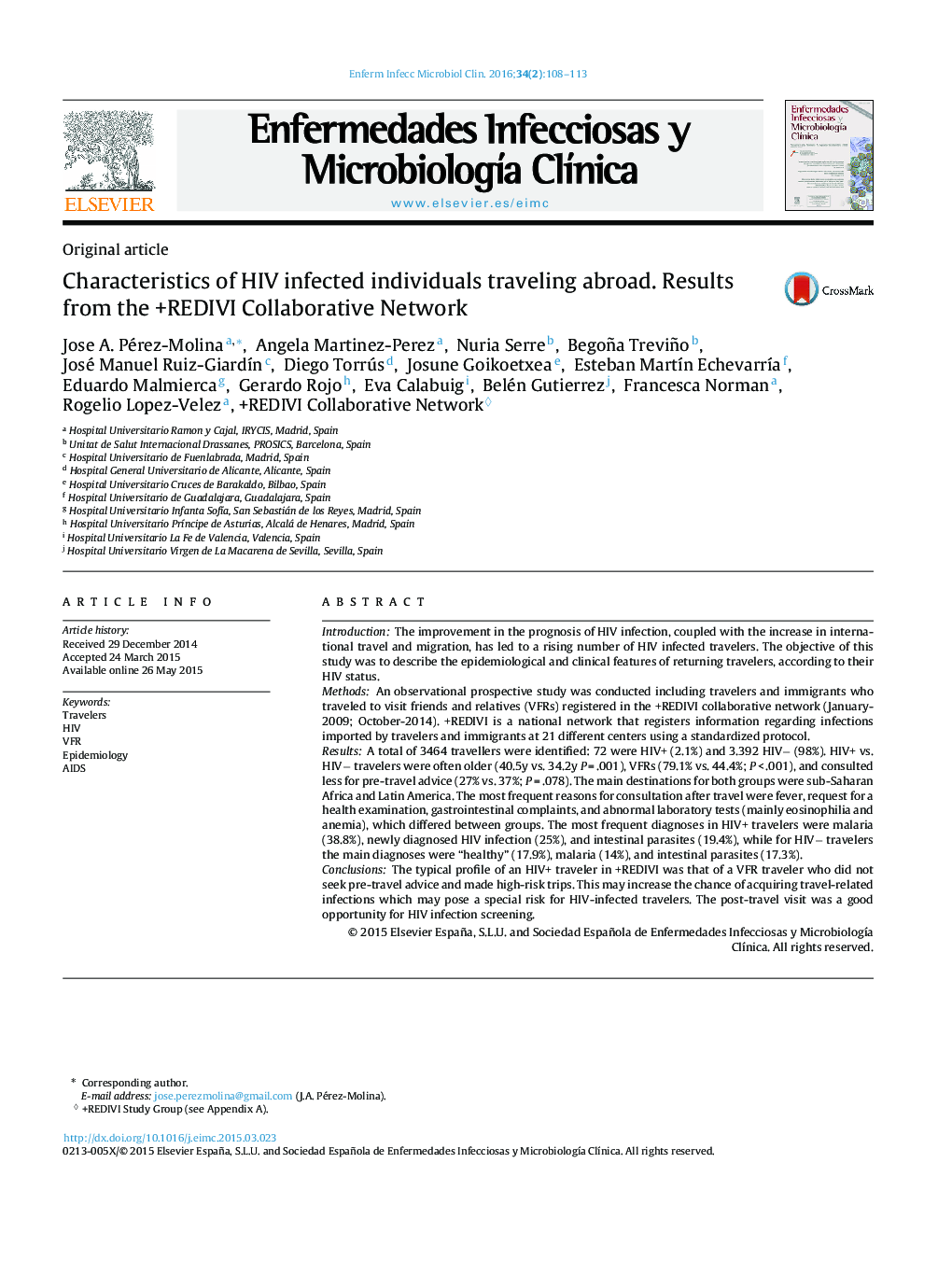| کد مقاله | کد نشریه | سال انتشار | مقاله انگلیسی | نسخه تمام متن |
|---|---|---|---|---|
| 3400608 | 1222620 | 2016 | 6 صفحه PDF | دانلود رایگان |

IntroductionThe improvement in the prognosis of HIV infection, coupled with the increase in international travel and migration, has led to a rising number of HIV infected travelers. The objective of this study was to describe the epidemiological and clinical features of returning travelers, according to their HIV status.MethodsAn observational prospective study was conducted including travelers and immigrants who traveled to visit friends and relatives (VFRs) registered in the +REDIVI collaborative network (January-2009; October-2014). +REDIVI is a national network that registers information regarding infections imported by travelers and immigrants at 21 different centers using a standardized protocol.ResultsA total of 3464 travellers were identified: 72 were HIV+ (2.1%) and 3.392 HIV− (98%). HIV+ vs. HIV− travelers were often older (40.5y vs. 34.2y P = .001), VFRs (79.1% vs. 44.4%; P < .001), and consulted less for pre-travel advice (27% vs. 37%; P = .078). The main destinations for both groups were sub-Saharan Africa and Latin America. The most frequent reasons for consultation after travel were fever, request for a health examination, gastrointestinal complaints, and abnormal laboratory tests (mainly eosinophilia and anemia), which differed between groups. The most frequent diagnoses in HIV+ travelers were malaria (38.8%), newly diagnosed HIV infection (25%), and intestinal parasites (19.4%), while for HIV− travelers the main diagnoses were “healthy” (17.9%), malaria (14%), and intestinal parasites (17.3%).ConclusionsThe typical profile of an HIV+ traveler in +REDIVI was that of a VFR traveler who did not seek pre-travel advice and made high-risk trips. This may increase the chance of acquiring travel-related infections which may pose a special risk for HIV-infected travelers. The post-travel visit was a good opportunity for HIV infection screening.
ResumenIntroducciónLa mejoría en el pronóstico de la infección por el VIH, sumada al incremento de los viajes y la inmigración, han aumentado la frecuencia del binomio viajero-VIH+. El objetivo de este trabajo es describir la epidemiología y hallazgos clínicos de los viajeros VIH+ en comparación con los VIH-.MétodosEstudio observacional y prospectivo, de los viajeros e inmigrantes viajeros que se desplazan para visitar familiares y amigos (VFR) incluidos en la red +REDIVI (enero-2009; octubre-2014). +REDIVI es una red nacional que recopila información sobre infecciones importadas por viajeros e inmigrantes en 21 centros mediante un protocolo estandarizado de recogida de datos.ResultadosSe identificaron 3.464 viajeros: 72 VIH+ (2,1%) y 3.392 VIH− (98%). Los VIH+ en contraste con los VIH−, eran mayores (40 vs. 34 años; p = 0,001), predominantemente VFR (79,7% vs 44,4%. p < 0,001), y solicitan menos consejo pre-viaje (27% vs 37%. p = 0,078). Los destinos predominantes para ambos grupos fueron África Subsahariana y Latinoamérica. Los motivos de consulta más frecuentes al retorno del viaje fueron la fiebre, solicitar un examen de salud, molestias gastrointestinales, y anomalías en los resultados de laboratorio (principalmente eosinofilia y anemia) los cuales variaron según el grupo. Los diagnósticos más frecuentes en los VIH+ fueron la malaria (38,8%), nuevo diagnóstico de VIH (25%) y parasitosis intestinales (19,4%), mientras que en los sujetos VIH− los principales diagnósticos fueron “sano” (17,9%), parásitos intestinales (17,3%) y malaria (14%).ConclusionesEl perfil más común del viajero VIH+ atendido en +Redivi es el de un inmigrante VFR que no solicita consejo pre-viaje y hace viajes de alto riesgo. Esto puede suponer un mayor riesgo de adquisición de infecciones relacionadas con el viaje, las cuales en un viajero VIH+ pueden tener un efecto deletéreo adicional. La consulta tras el viaje es una buena oportunidad para el cribado de la infección por VIH.
Journal: Enfermedades Infecciosas y Microbiología Clínica - Volume 34, Issue 2, February 2016, Pages 108–113